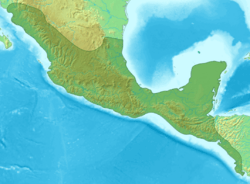Pahñú facts for kids
| Location | Tecozautla, Hidalgo, |
|---|---|
| Region | Hidalgo |
| Coordinates | 20°32′50.96″N 99°38′26.89″W / 20.5474889°N 99.6408028°W |
| History | |
| Periods | Late Preclassic to Late Classic |
Pahñú, also called Pañhú, is an exciting archaeological site located in Tecozautla, in the Mexican state of Hidalgo. It was once a busy settlement of the Xajay culture. People lived here between 300 and 1100 years ago.
This ancient city seems to have connections to the older Chupícuaro culture. It is also linked to the origins of the Otomi people who lived in the Mezquital Valley.
What Does Pahñú Mean?
The name Pahñú comes from the Otomi language. It is made of two words:
- pa means hot.
- hñu means pad or way.
So, the name Pahñú can be understood as Hot pad.
History of Pahñú
The ancient site of Pañhú was found on Hualtepec hill, also known as La Mesilla. This area is close to the Tecozautla Valley. It was an important settlement for the Otomi people of the Xajay Culture. They lived here at the same time as the famous Teotihuacan Culture was thriving.
Archaeologists from INAH (Mexico's National Institute of Anthropology and History) started working at Pahñú in 2007. They carefully uncovered and studied the ruins. The site was finally opened for people to visit in 2015.
See also
 In Spanish: Pahñú para niños
In Spanish: Pahñú para niños
- Mezquital Valley
 | Frances Mary Albrier |
 | Whitney Young |
 | Muhammad Ali |


